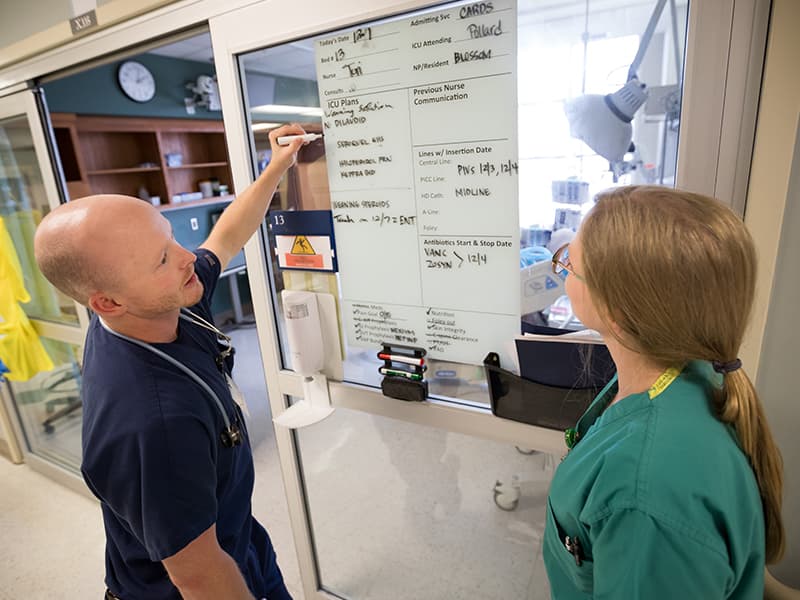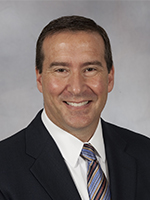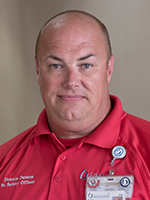UMMC one step closer to high reliability in patient care

It’s one more milestone in the University of Mississippi Medical Center’s journey to becoming a high-reliability organization that consistently gives all patients quality, safe care.
And, it’s an important one. Five days of scrutiny by a team of 10 surveyors from The Joint Commission, the accrediting body that visits most U.S. hospitals once every three years, has given UMMC’s leaders and front-line caregivers a good idea of how they’re successfully serving patients --and where they fall short.

The surveyors’ findings are detailed in a 43-page report still being digested by leadership, but “overall, we did a phenomenal job,” Kevin Cook, UMMC Health System CEO, told dozens involved in the visit who gathered for a debriefing after surveyors departed Friday. “We got a long, very good look by the JC.”
The team, which together amassed the equivalent of 43 surveyor days of work, assessed how well employees comply with processes important to clinical care and safety. That can range from making sure exit lights have all bulbs burning to ensuring a high level of disinfection and sterilization of surgical instruments.
Surveyors pointed out both concerns and kudos. “The bottom line is, we are making significant progress, but there is still a lot of work to do,” said Dr. Michael Henderson, UMMC’s chief medical officer.
Surveyors routinely scout hundreds of scenarios to see if they’re in compliance with best national practices for patient safety and clinical care. Just a few examples:
- Who do you call if there’s an outpatient Code Blue?
- Do staff know what to do in the event of an active shooter?
- Are pain medications administered according to a pain scale and physician orders?
- Are refrigerators, cabinets and freezers clean?
- Are surgical sites properly marked, and are there procedures for isolating patients whose sickness warrants it?
- Are sharps containers in secured areas?
- Are patients screened for suicide risk, and are they kept in areas that are free from ligature risk?
It’s the surveyors’ job to pinpoint even the smallest infractions. The biggest non-compliance issues, called sentinel events, are unexpected occurrences in which a process has broken down so badly that there’s a death, serious physical or psychological injury, or serious risk of that happening.
The visit was so thorough that one surveyor scrutinized the ceiling of an eighth-floor elevator room, Cook said. “They were in every nook and cranny,” he said.
The surveyor team gave daily feedback on both non-compliance observed, and processes so good that they deserve to be listed in the commission’s leading practice library, an online collection of solutions to help hospitals nationwide with health care safety.
A sampling of non-compliant items noted: breast milk out of date, crash cart checks incomplete, several doors not unlatching or unlocking, instruments not pre-cleaned appropriately at the point of use, and unlabeled solutions on an environmental cleaning cart, to name a few. There were three Centers for Medicare and Medicaid Services’ “Condition of Participation” findings in the areas of environment, infection control and surgical services that will trigger a re-survey in approximately 30 days.
Kudos included the processes for tracking and reporting data as well as attention to the patient experience and health disparities; staff being open, professional and engaged; cleanliness of outpatient facilities; the Wall of Heroes that spotlights organ donors; and excellent care plan processes and documentation.
“There were no show-stoppers,” Cook said. All non-compliant issues “can be addressed, will be addressed, and are fixable.”
Hosting the week-long visit was a huge undertaking for a diverse team and behind-the-scenes command center that included director of accreditation Judy Flynt, senior safety officer Donnie Denton, and those who tracked and chronicled the visit, including Carmen Howard, accreditation specialist.
“Overall, we had a really good survey,” Denton said. “We had some best practices that they identified so far as how we do our training with the Jackson Fire Department, and they’re really impressed with the work being put into having a current sprinkler inventory.

“We had no deficiencies in any of our document reviews,” Denton said of safety reviews conducted by the survey team’s life safety engineer. And, he said, UMMC wasn’t cited for one of the biggest thorns in the sides of hospitals: corridor clutter.
One of the biggest shining stars surveyed was MED-COM, Denton said. “They’d never seen anything like it,” Denton said. “MED-COM is a beacon to all surveyors.
“It’s all about detail. To me, that’s the whole thing,” Denton said. “We have to pay the same amount of attention to the small details as we do to the big things.”
What impressed her, said adult hospital chief nursing officer Terri Gillespie, was the surveyors’ comment that ‘We love your staff. They’re engaged. Nobody ran.’’’
And then, there were the moments where you didn’t know whether to cringe or chuckle. Cook recalled when Margaret Head, the Medical Center’s new chief ambulatory officer, hosted a surveyor at the Jackson Medical Mall. “A pest control guy walked in on them and said, ‘I’m here to kill the roaches,’’’ Cook said.
More than once, surveyors praised employees for being very engaged in the process. They’ve given Medical Center leadership deadlines to come up with a plan to address non-compliant items, and to implement it.
“They understand that we’re not a facility that tries to hide things. We’ve been very open and honest,” Denton said.


